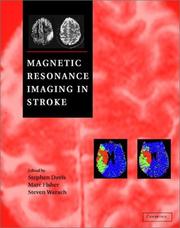| Listing 1 - 2 of 2 |
Sort by
|

ISBN: 1107131316 1280160861 9786610160860 0511119801 1139147366 0511063776 051105744X 0511308264 0511544928 0511072236 9780511063770 9780511072239 9780511119804 9780511544927 9780521806831 0521806836 9781280160868 6610160864 0521806836 9781107131316 9781139147361 9780511308260 Year: 2003 Publisher: Cambridge, UK New York Cambridge University Press
Abstract | Keywords | Export | Availability | Bookmark
 Loading...
Loading...Choose an application
- Reference Manager
- EndNote
- RefWorks (Direct export to RefWorks)
Magnetic resonance imaging provides non-invasive information about the brain's blood flow, water movement and biochemical abnormalities following stroke, and advances in magnetic resonance imaging (MRI) are transforming the investigation and treatment of cerebrovascular disease. Echoplanar techniques with diffusion and perfusion weighted imaging, together with developments in magnetic resonance spectroscopy and angiography, are replacing CT scanning as the diagnostic modality of choice. In this profusely illustrated book world leaders in these technologies review the scientific basis and clinical applications of MRI in stroke. It will appeal to a broad readership including stroke physicians, neurologists, neurosurgeons, rehabilitation specialists, and others with a clinical or research interest in cerebrovascular disease.
Cerebrovascular disease --- Apoplexy --- Brain --- Cerebral circulation disorders --- Cerebral vascular accident --- Cerebrovascular accident --- Cerebrovascular disorders --- Cerebrovascular syndrome --- CVA (Disease) --- Stroke --- Neglect (Neurology) --- Magnetic resonance imaging. --- Blood-vessels --- Diseases
Film
Year: 2000 Publisher: [Bethesda, Md.] : National Institutes of Health,
Abstract | Keywords | Export | Availability | Bookmark
 Loading...
Loading...Choose an application
- Reference Manager
- EndNote
- RefWorks (Direct export to RefWorks)
Explains the rationale and logistics for quickly discerning and responding to stroke. Includes comments by Dr. Steven Warach, NIH Stroke Center at Suburban Hospital, and Dr. John Marler, National Institute of Neurological Disorders and Stroke.
| Listing 1 - 2 of 2 |
Sort by
|

 Search
Search Feedback
Feedback About UniCat
About UniCat  Help
Help News
News